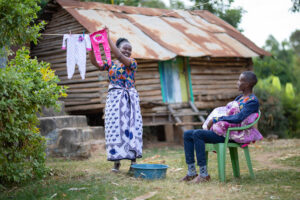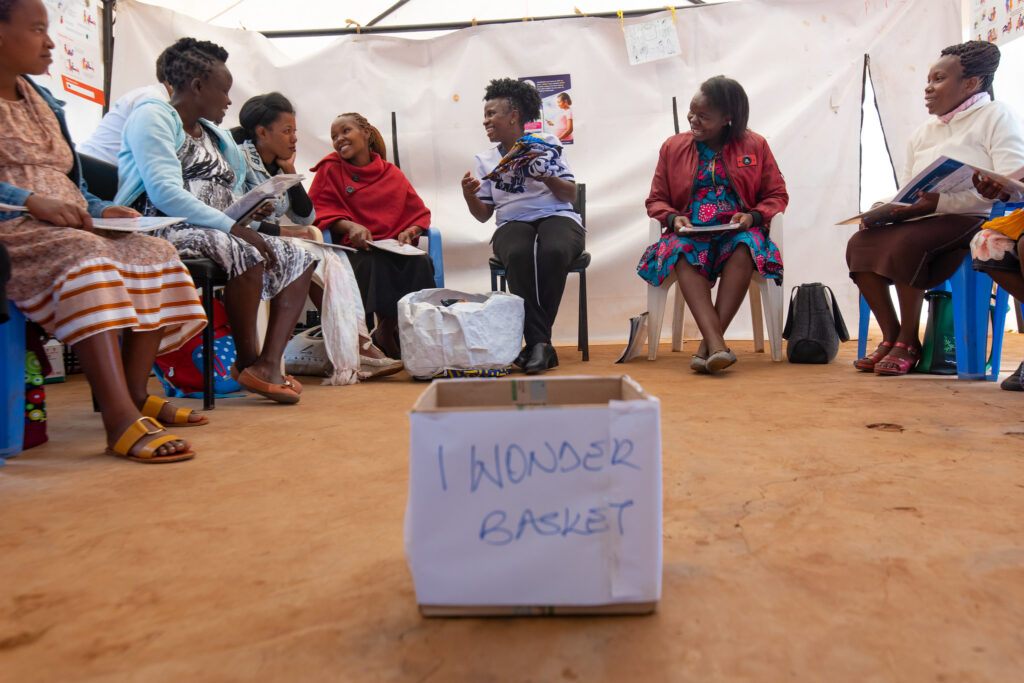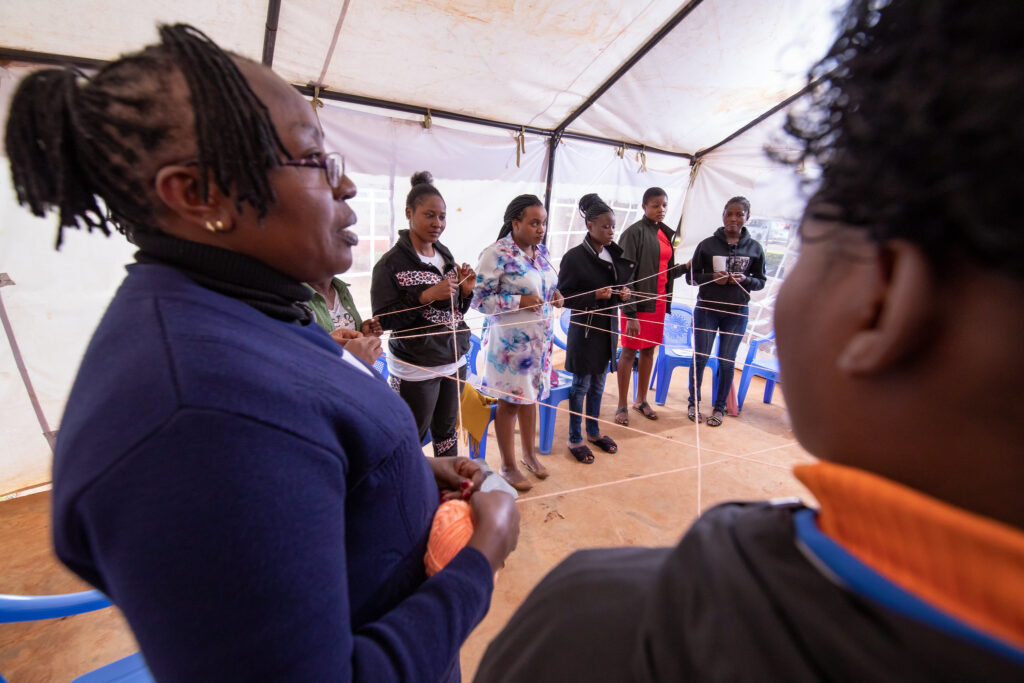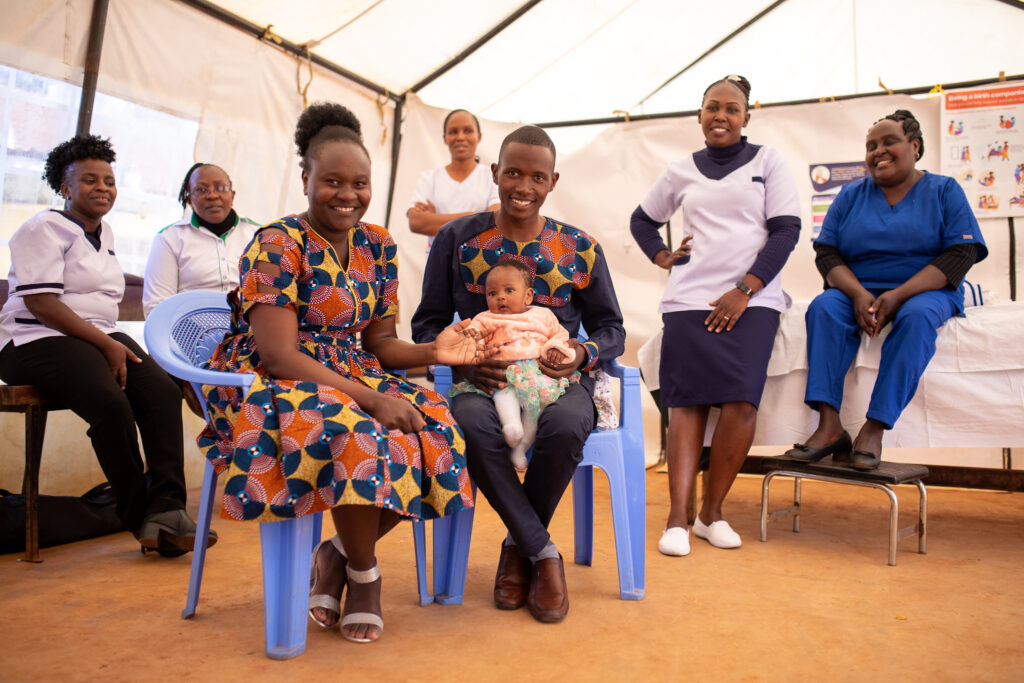Linda and Daniel Mulemi’s journey to first-time parenthood began about one year ago, when they were busy working on their event-planning family business.

“It all started with a headache that would not go away. My mother-in-law urged me to go to the hospital. I went and did a couple of tests. The pregnancy test was positive. We were so happy because we wanted to start a family,” said 28-year-old Linda.
When she was six weeks pregnant, Linda was introduced to the group antenatal care (G-ANC) sessions at Kangundo Hospital in Kenya. G-ANC brings together a group of women to learn, share and experience pregnancy together. Meeting monthly with the same group fosters friendships and support and improves the experience for women. “This was my first pregnancy and I knew nothing. I went ahead and attended the group sessions,” she said.
Linda attended all G-ANC sessions and her husband noticed a difference.
“She would be singing while doing her chores . . . it was a way of memorizing what they were learning,” he said. “Linda shared her notes with me after every class. We were moving step by step together. I saw the benefits of the classes and supported her to attend without fail.”
“I wanted to get as much information to prepare me for the pregnancy and delivery,“ Linda explained. “My favorite topics were how to observe problems, danger signs and taking care of myself. One time, I noticed some discharge from my breasts. My friend told me it’s a miscarriage. During my next class, I wrote my question and dropped it in the wonder basket. It was not a sign of a miscarriage.”

The “I Wonder Basket” is a box where G-ANC participants can anonymously drop their written queries. The facilitating nurse-midwife privately helps women with low literacy skills to add their questions, and she engages the group to help answer the questions at the end of the meeting.
G-ANC is associated with a higher proportion of women receiving quality services, including more antenatal care checkups. Women also report a positive experience in G-ANC, sharing that they were able to ask questions and learned important things about preparing themselves for childbirth and post-birth and keeping their baby healthy.
They also reported forming meaningful relationships and a spirit of open communication with their health care providers.
Pauline Muema, a nurse at Kangundo Hospital, remembers Linda’s engagement with the other women in the group.
“Linda asked questions, oriented [other pregnant women as they] joined the group, and she became the group leader,” said nurse Pauline. “She delivered a healthy baby girl in our health facility. Baby Bella is four months old. We walked together during her pregnancy and now we are monitoring Bella as she grows. “
Kangundo Hospital was one of the first facilities in Kenya to introduce G-ANC, during a Jhpiego research study on G-ANC in 2016, and staff have remained enthusiastic about the approach. In 2021, the Machakos County Health Management Team selected Kangundo as one of 12 facilities to adopt G-ANC as the routine standard of care so that all pregnant women may benefit. County managers partnered with Jhpiego to scale up G-ANC and learn together about what is needed to make and sustain this change, so other facilities and counties throughout Kenya can more easily switch to G-ANC. Implementation and learning are supported by Jhpiego with funding from the Bill & Melinda Gates Foundation.
Machakos County managers are sharing their experience with G-ANC with other counties, and the county has already helped train providers in Makueni and Vihiga Counties.

The transition to offering all women G-ANC is only possible when ANC providers like Pauline Muema buy in. She has been a champion since Kangundo started offering G-ANC. Through member-guided group discussions, traditional aspects of antenatal assessment such as clinical checks are blended with information sharing and peer support.
“With one-on-one ANC sessions, there are no targeted messages. But with group ANC we have a flow [of information],” said nurse Pauline. “Sometimes a mother may walk into the clinic and she is 28 weeks [pregnant]—where would you start, danger signs or family planning? With the group ANC we are able to have time and link the moms to each other for support.”
To date, Pauline has formed and facilitated 80 groups, hosting 500 meetings and reaching more than 1,400 moms at Kangundo Hospital. In total, from March 2022 to August 2023, 11,000 pregnant women in Machakos County have received their antenatal care through G-ANC in 12 health facilities.

“It has been an amazing journey—from pregnancy, delivery and now parenting. We are so blessed to have a great support system at the health facility; we are walking together as we parent and nurture this beautiful girl,” said Daniel.
In addition to Jhpiego’s work in Kenya, the organization currently supports health managers and ANC providers to implement and scale up G-ANC in Afghanistan, Burkina Faso, Ethiopia, India, Nigeria and Pakistan.
Anne Hyre, project director of the Antenatal/Postnatal Research Collective, and Stephanie Suhowatsky, Principal Technical Advisor, reviewed this article.
Joan Nduta is Senior Communications Manager for Jhpiego’s Africa Region. Photos by Lameck Ododo.



